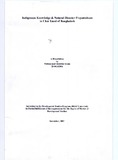Indigenous knowledge & natural disaster preparedness in char land of Bangladesh

View/Open
Date
2007-12Publisher
BRAC UniversityAuthor
Islam, Mohammad ShahriarMetadata
Show full item recordAbstract
Since the 1970s, evidence that local knowledge and practices can help implementing organisations to improve disaster preparedness activities has grown; notwithstanding this evidence, the marginalisation of local knowledge and practices by mainstream literature and institutions involved with disaster management continues.
A local knowledge system is composed of different knowledge types, practices and beliefs, values, and worldviews. Such systems change constantly under the influence of power relations and cross-scale linkages both within and outside the community. As such, local knowledge and practices need to be understood as adaptive responses to internal and external changes which result (or not) in disaster preparedness at local level. In order to identify local knowledge on disaster preparedness, one should locus on tour key aspects: people's ability to observe their local surroundings, people's anticipation of environmental indicators, people's adaptation strategies. and people's ability to communicate about natural disasters within the community and between generations. Overall, the ability a community has to prepare itself for disaster preparedness needs to be understood within the broader context of livelihood security and sustainability and building up community resilience in the long term.
I went to Kurigrarn to gather knowledge on the topic of my dissertation. After deciding my dissertation topic as 'Indigenous knowledge & disaster preparedness in char area of Bangladesh' I have already gone though few references, books, journals and periodicals. To understand more I have also gone through internet sites also. With the help of my respected supervisor and few other colleagues I have also talked with some knowledgeable persons who have been working in this field of indigenous knowledge & disaster preparedness. I have also talked with few people who have work experiences in char land, environment and climate change projects.
There has been a big difference of understanding between the theories you learned from books and works you do in the field in reality. If a researcher wants to dig through his/her research question to get the most accurate and true result, there is no other way to get it better than going to the field of reality. That is why my supervisor told me to go to the field as soon as possible to have field research. And as I was planning to go to Kurigram which would fulfill the research needs my supervisor was happy about my site selection also.
